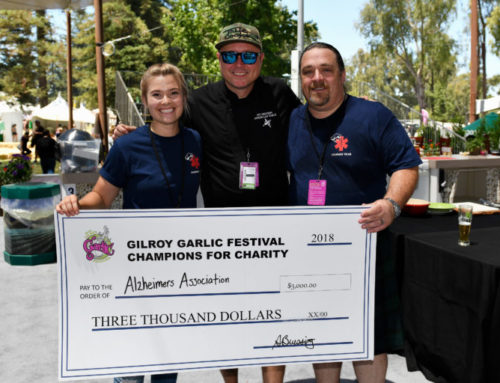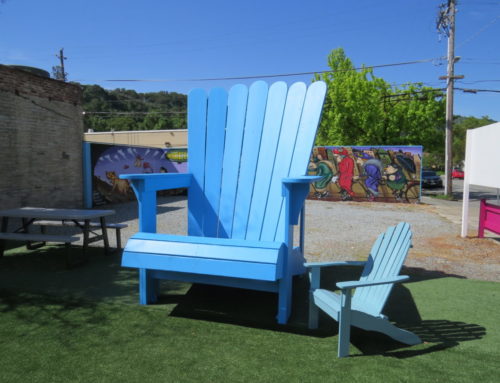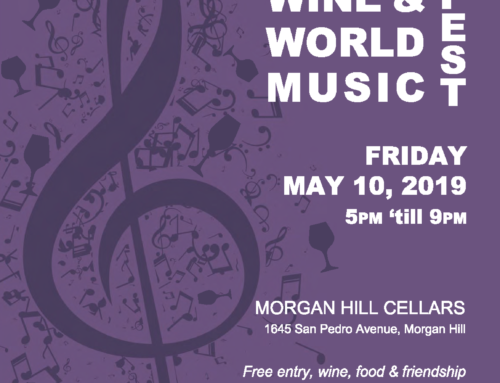Published on Page 12 of the August 7, 2013 issue of Morgan Hill Life:
By Marty Cheek

Marty Cheek
Nelson Gabbard’s life was a love story. He loved his wife and he loved his life with a passion that is truly rare in most mortals.

Bonnie and Nelson Gabbard on their wedding day.
I came to know Nelson when I served on the Morgan Village Homeowners Association board. Every month, a paralyzed, elderly gentleman in a motorized wheelchair and his gracious wife attended the meetings. They asked intelligent questions and made thoughtful comments about whatever matter was under discussion. After one meeting, the Gabbards invited me to their home for coffee. We became fast friends.
Nelson was born March 11, 1924, in Fayetteville, Ark., the eighth of 10 children. He grew up working in his father’s Ozarks lumber mill. At 17 he enlisted in the U.S. Army Air Corps. As America entered the war, Nelson flew combat missions as a flight engineer over Italy and France. In one close call, his helmet was hit by shrapnel. He received a medal from the French government for helping liberate France from Nazi occupation.
Returning to America, he attended a church picnic and met a pretty teenager named Bonnie Mae Zumwalt. Whatever chemistry that happens in the human heart that joins two people in a bond of love happened to them. They married June 16, 1945, moved to San Jose and welcomed a baby daughter they named Donna.
The conflict in Korea called Nelson back into active duty with the Air Force. He served 13 months in Japan. Every day he wrote letters to Bonnie and Donna. One time, Bonnie took Donna into a recording studio to make a phonograph record so Nelson could hear his toddler daughter’s voice.
Returning to San Jose, Nelson worked for a time as a machine shop apprentice at Food Machinery Corp. Bonnie during this time gave birth to their son Tom. After his apprenticeship ended, Nelson found work as a machinist at NASA’s Ames Research Center. He spent 20 years there, building devices that helped America take its first steps into space. He and I would often talk about the excitement that ignited the country’s imagination in our national quest to land on the moon. Somehow, sadly he would observe, America in the 21st century had lost much of that zeal for exploration.
Nelson kept active in his Christian faith. He served as an elder at the Campbell Church of Christ and was involved in an annual humanitarian mission to San Felipe, Mexico. He lived a faith of service for the betterment of humankind.
After Nelson retired from NASA, he and Bonnie settled on a farm near Moss Landing. With days blessed with ocean breezes, “Papa Nelson” loved taking his grandchildren to experience rural wonders such as riding the tractor, collecting chicken eggs and chasing lizards. Then, Nelson started noticing a weakness in one of his knees, the first hint of Inclusion Body Myositis, a degenerative auto-immune disease. Unable to work the farm as his condition worsened, he and Bonnie moved to a townhouse in Morgan Hill. With an abiding cheerfulness, he stayed active in his motorized wheelchair, working with his beloved tools in his garage, enjoying neighborhood summer barbecues and, of course, attending monthly homeowners association meetings.
In 2007, cancer took Bonnie. Their happy marriage lasted 62 years. Nelson moved to Lincoln Glen Manor in Willow Glen. Whenever I was in San Jose, I’d visit him at the assisted-living home. Once a month we’d chat on the phone and he told me about the nice people he met on his morning visits to the nearby Starbucks he jaunted to in his motorized chair. He often let me know how much he missed Bonnie — “the love of my life, my best friend,” he’d call her. He longed to die, he told me. He just couldn’t wait to join Bonnie again.
In recent conversations, I told him about my new enterprise, a community newspaper called Morgan Hill Life. He especially liked the fact it would focus on quality-of-life news.
On June 26, the day the very first Morgan Hill Life issue reached mailboxes, I couldn’t wait to call him and tell him the newspaper had become real. That morning was bittersweet. I found on my computer an e-mail sent by his son Tom that brought tears to my eyes: “Dad died this evening peacefully in his room at Lincoln Glen. Donna was with him. He declined very quickly and only began accepting morphine for pain a few days ago.”
In the chapel of the Campbell Church of Christ where Nelson’s memorial service was held July 27, every seat was filled with family and friends who loved the man whose life was a love story.






